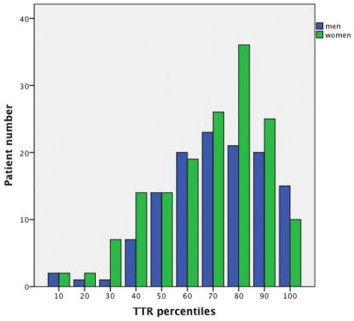Anticoagulant drugs (warfarin, UFH and LMWH, and direct thrombin and factor Xa inhibitors) routinely used for the prevention of thromboembolism in patients with nonvalvular AF, mechanical heart valves, deep venous thrombosis, intracavitary thrombus. Warfarin treatment confers a substantial risk of bleeding, and the reduction in thrombo-embolic events must be carefully weighed against the risk of bleeding for each individual patient. Monitoring and tight control of anticoagulation treatment reduce the risk of both thrombosis and bleeding, and time in therapeutic range (TTR) is an important tool to assess the quality of the anticoagulation treatment given.
Patients that are on oral warfarin treatment for variety of reasons are being followed in our facility. For those patients, a special outpatient clinic is found to ameliorate patients INR follow-up and drug compliance.
In our study 301 patients that are on oral warfarin treatment, are evaluated retrospectively. 133 of them were men(%44.2) and 168 of them were women(%55.8). The mean age in the study group was 61.2+-13.4. The mean CHA2DS2-VASc score was 2.41+-1.55 and HAS-BLED score was 1.76+-1.14. Approximately 12 months of follow-up periods were evaluated. 12 different INR values of each patients were recorded. The average time period between INR visits was recorded as 28,9 days. To assess the efficacy of the treatment, Rosendaal TTR method was used. TTR values that are calculated with Rosendaal method were found %65,4. The number of patients with TTR score <60, which is calculated with Rosendaal method, was 110(%36.5), and TTR >60 was 191(%63.5). There was a distinct positive correlation between age and CHA2DS2-VASc score as expected (R=0.668, P<0.01) and negative correlation between age and TTR value R=-0.122, P=0.034. Patients are evaluated according to their demographics, comorbidities and characteristics.
An outpatient clinic assigned to INR follow-up was found to have no impact on oral warfarin treatment efficacy in third grade cardiology facility. Oral warfarin treatment indications were taken into account as the results of this study were being evaluated. The results of this study are important because it is the first one in Turkey, which evaluates the efficacy of oral warfarin treatment.





